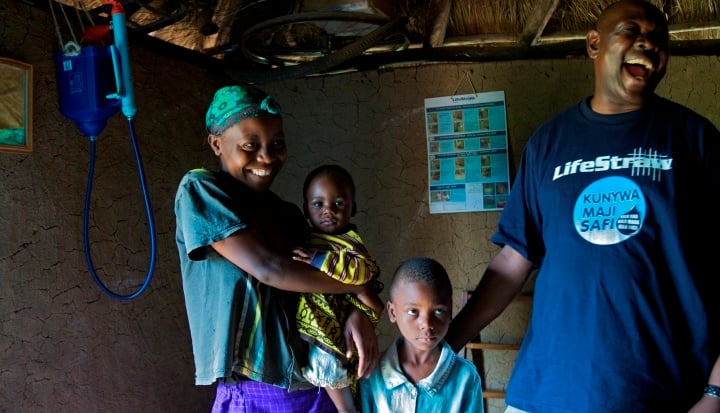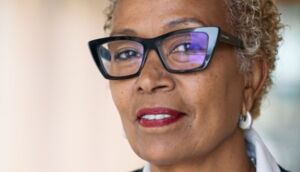In the spring of 2011, Vestergaard embarked on a bold initiative to provide over 4 million people in Kenya’s Western Province with access to safe drinking water. Investing roughly 30 million dollars of our own funds, the company took a significant risk to prove that carbon finance could be a new way to unlock funding for the delivery of high quality and highly protective drinking water technologies at scale. This program, LifeStraw® Carbon for Water, was and to our knowledge remains the largest private sector investment in the provision of household level safe drinking water for the developing world. To get the program off the ground, we collaborated with partners with strong experience in the energy and carbon finance space: Manna Energy and ClimateCare.
We are now three years into the program in which we distributed 877,505 LifeStraw® Family filters to households in Kenya. We have a full-time staff of 46 local coordinators on the ground who engage in continuous health education and community mobilization efforts. In addition, they provide an infrastructure for free repairs and replacements of the filters.
We also undertake large-scale household visitations through a network of more than 1,500 safe water volunteers who we hire for several weeks per year to do more formalized educational visits to households. We conduct annual monitoring and evaluation of the program in which comprehensive surveys are conducted in a random sample of over 7,000 households annually. We also hire an outside agency to conduct an additional annual monitoring survey to ensure our own data is unbiased. And finally, due to the extensive requirements of running a carbon finance program, we undergo an annual audit, complete with field visits from UN accredited auditors where they too conduct household surveys to verify reported results.
All of these activities can be expensive to maintain but we have found them necessary to not only meet but also to exceed the requirements of the Gold Standard Foundation – the crediting agency for our Carbon Program- and to ensure that the program is running effectively and households continue to use the filters and access safe water from them. To ensure that programs like this are meeting targets and generating measurable health and environmental impact, it is important to us to raise the bar on the quality of monitoring and improve our data systems to get the most accurate data possible. To date, we are averaging slightly over one million tonnes of emissions reductions per year.
From the outset of the program, we were both hailed as private sector innovators making use of a new funding stream and heavily criticized as private sector players engaging in the WASH sector, using a questionable method of finance to make money. As a result of the criticism, our program has been carefully and closely scrutinized but this has only pushed us to ensure that we are continuously improving our education and monitoring practices and transparently reporting our results (all audit and monitoring reports are publicly available via the Gold Standard Foundation website).
Being challenged on reported data generated collaborative efforts by experts to improve surveys and has ultimately made our program and reporting stronger. It is our hope that this work will continue to raise standards for similar WASH programs globally. Toward this end, we have undergone an independent expert review of our monitoring practices by Berkeley Air Monitoring Group and continue to refine our methods.
The program has not been without its challenges: when we started the program in 2011, the market for carbon credits was strong and prices were high. In the last several years we have seen a precipitous fall in prices with little recovery. This has lengthened the time it will require to recover our investment, and it has also forced us to reduce some program activities and streamline others (for example, we had originally planned household visits every 6 months). Despite the risks, there are also advantages to a market-based, pay-for-performance system.
For starters, it brings private, external funding to a space that largely relies on public funds and is woefully under-funded. It also encourages innovation and prioritizes longer lasting, highly protective, cost effective technologies. The system has also pushed us to be agile and adaptable: our finance is tied to program results (for example: we only claim credits from the percentage of households reported to be consistently using the filters), so we have to find ways to implement the most efficient yet effective program possible. And thus far, we have managed to find that balance: we are proud to still be going strong three years later amongst a backdrop of volatility in climate finance and lingering skepticism from some critics. We have proven the concept which has opened the sector to more investment: as an example, Del Agua is embarking on a very large initiative in Rwanda to finance distribution of LifeStraw® water filters and clean cookstoves, intending to cover over 600,000 households.
While it may have some drawbacks, carbon finance has provided a method of delivering high quality water purification to the world’s most vulnerable. Without it, millions of people in Western Kenya would remain without access to technologies that meet WHO highly protective standards of water quality. Yet, the current uncertainty in global climate policies is keeping prices low and hindering more private investment. However, there are some positive indicators: WHO just released a testing scheme for household water treatment, creating international testing and certification standards that will ensure that treatment options are properly labeled by effectiveness.
This should create more certainty around acceptable technologies. International actors are also increasingly coming to the table to invest in these types of programs that create both climate and health-related benefits.
As the markets continue to fluctuate, we will continue to adapt. Doing good and doing good business is at the heart of Vestergaard’s humanitarian entrepreneurship business philosophy. We have and will remain steadfast in the commitment we made to the Government of Kenya and to the people of Western Province: to provide them with sustainable access to safe drinking water over the long term.











